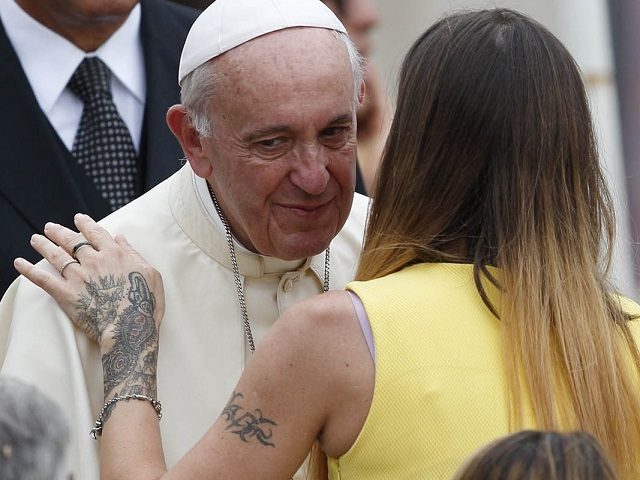There is nothing wrong with tattoos, Pope Francis told a group of young people Monday, urging them to be open to cultural expressions of “belonging.”
Asked about tattoos and other expressions of modern culture by a seminarian from Ukraine, the pope said that the problem is that some people exaggerate by covering their body with tattoos, but “the problem is the exaggeration, not the tattoos.”
Yulian Vendzilovych, a seminarian at Holy Spirit Seminary in Lviv, told the pope that some people sport tattoos to express beauty, and others as a cultural symbol, but it is not easy for a young priest to judge which parts of modern culture are good and which are not.
“Don’t be afraid of tattoos,” the pope responded, noting that for many years Eritrean Christians and others have gotten tattoos of the cross on their foreheads.
“Of course, there can be exaggerations,” the pope said, remarking that people who get too many tattoos cannot give blood because of a “danger of blood poisoning.”
A tattoo “is a sign of belonging,” Francis said, and offers an opportunity to strike up a conversation with young people about what matters to them “and then you can enter into the culture of the young.”
“But do not panic,” he said. “With young people you should never be frightened, never! Because always, even behind the not-so-good things, there is something that will get us to some truth.”
Pope Francis has often weighed in on issues affecting young people and modern culture, insisting that the Church be open to where people are.
Last March, however, the pope warned youth to beware of the falsehoods behind much of social media and “reality shows,” urging them to live their own lives and to create their own histories.
The pope’s Message for World Youth Day 2017 contained a lengthy commentary on the hi-tech world in which young people are immersed, comparing the memories of their personal experiences with the computer hardware that stores large quantities of data.
“Yet our memories should not remain crammed together, like the memory of a hard drive,” Francis said. “Nor can we archive everything in some sort of virtual ‘cloud.’ We need to learn how to make past events a dynamic reality on which to reflect and to draw lessons and meaning for the present and the future.”
He was quite critical of attachments to social media and so-called reality shows, warning youth that virtual friendships and virtual reality often conceal many falsehoods and are no substitute for real interpersonal experiences.
“In the social media, we see faces of young people appearing in any number of pictures recounting more or less real events, but we don’t know how much of all this is really ‘history,’ an experience that can be communicated and endowed with purpose and meaning,” Francis said.
The pope has made extensive us of social media during his five-year pontificate, and a 2015 study proclaimed him to be the most influential person on Twitter for the third year in a row.
Yet in spite of his own success with social media, he remains skeptical of its real influence.
“Television is full of ‘reality shows’ which are not real stories, but only moments passed before a television camera by characters living from day to day, without a greater plan,” he said in his message to the young. “Don’t let yourselves be led astray by this false image of reality! Be the protagonists of your history; decide your own future.”
Follow Thomas D. Williams on Twitter Follow @tdwilliamsrome

COMMENTS
Please let us know if you're having issues with commenting.